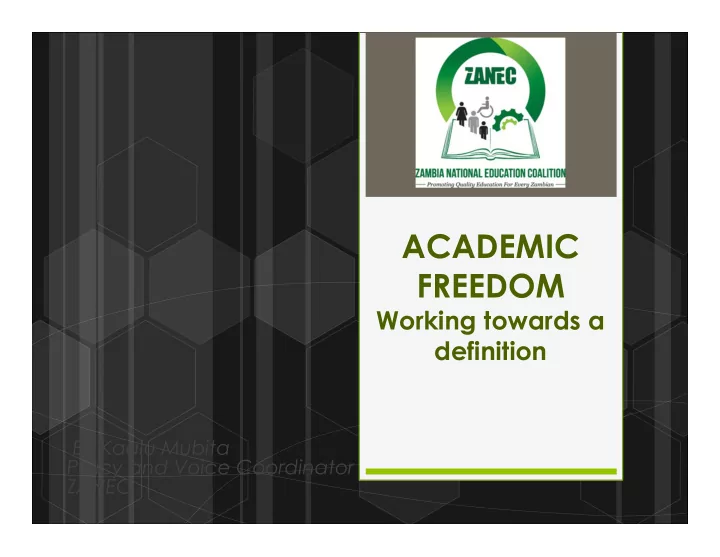

ACADEMIC FREEDOM Working towards a definition By Kaalu Mubita Policy and Voice Coordinator ZANEC
Presentation Outline Who is ZANEC Academic Freedom definition in Zambia 2014 & 2017 Study Code of conduct and policy Challenges
Background: Who is ZANEC? Zambia National Education Coalition is a national coalition of civil society orgs (CBOs, NGOs, FBOs, Teacher Trade Unions, Student Unions) facilitating advocacy in the Zambian education and skills sector Vision: “ A sustainable and inclusive education system that responds to national aspirations and fosters an environment for self fulfillment ”
Background: Who is ZANEC? Works in 5 areas of education Early Childhood Care Development and Education Basic Education Tertiary and Skills Youth and Adult Literacy Gender and equity
Defining Academic Freedoms in Zambia – 2014 study A research study supported by SAIH conducted by University of Zambia Professor John Simwiinga, aiming to: Document current status on and the understanding of Academic Freedoms in Zambia Recommendations to improve Academic Freedoms The study highlighted that no public university in Zambia could claim to enjoy academic freedom “Full autonomy would entail universities being able to charge economic fees for the cost of education which would include monies to be expended on the various cost centres such as staffing, accommodation, teaching and learning materials and resources, research, publications and conferences. Currently, in each of the three universities the fees are regulated by the government, yet the same government does not sufficiently fund the universities and insists that universities should raise their own money for their operations. In my view, therefore, we cannot talk of academic freedom in such a scenario”
Defining Academic Freedoms in Zambia- 2014 study Student union definition: “A practical example of academic freedom would be where a student writes an article on what the student deems to be failures of the government with the intention of educating the citizens on an alternative way in which government would have managed the country without fear that the government would come in and charge them with treason, victimze them arrest, withdraw their bursaries or end their academic life at such an institution”
Defining Academic Freedoms in Zambia - 2014 study Academic Freedom comes with responsibility and integrity the expectation in the university world is that the teaching timetable constitutes a contract between the lecturer and the student and is not supposed to be violated A.F Not the freedom to riot, but the freedom to pursue knowledge and information “We should fight more on what idea is better than to take physical action on certain things so form me most of the problems that arise are of a result of failure to understand what really this academic freedom is. It is not the freedom to riot, it is not a freedom to withdraw labour”
Defining Academic Freedoms in Zambia – 2017 Generic Code of Conduct and Policy In 2017 ZANEC created a Generic Code of Conduct & policy document for university staff and students The 2014 study participants recommended that the implementation of these documents would enhance the definition & practice of academic freedom in Zambia Since higher institutions of learning in Zambia are at different levels in terms of systems, infrastructure, staffing levels, student enrolment, number of programmes running and other variables, it was not possible to develop a single academic freedom policy document or a single academic freedom code of conduct document which would apply to all the institutions Key Outcome - Ministry of Higher Education & ZANEC to distribute the Generic Code of Conduct and Policy to ALL Zambian Universities
Challenges in the definition and practise of Academic Freedoms While opportunities exist for staff to exercise academic freedom through generation and dissemination of knowledge, actual practice is compromised by: Poor financing -> little research output eroding academic culture, poor institutional autonomy Influx of private/public sector bringing in KPI/hierarchy – causing erosion of academic culture intermittent withdrawal of labor Lecturers overwhelmed by administrative duties, further impeding research output which impedes curriculum and service delivery construing divergent views from university staff and students as having been instigated by the opposition even in the face of irrefutable evidence that these views are based on research findings Lack of explicit legislation enshrining academic freedom
CONCLUSION With Academic freedoms being practiced partially this provides a platform to advocate for the full implementation of Academic Freedoms by : Advocating for legislature to protect A.F Continue to create an agreed understanding and appreciation of what Academic Freedoms are by both academic staff and students
THANK YOU
Recommend
More recommend